|
|
|
Sort Order |
|
|
|
Items / Page
|
|
|
|
|
|
|
| Srl | Item |
| 1 |
ID:
187319
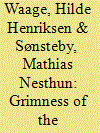

|
|
|
|
|
| Summary/Abstract |
In 1977, United States president Jimmy Carter wanted a comprehensive peace for the Middle East. Amid the devastating civil war in Lebanon, Israel had found common ground with Christian militias and turned against the Palestinians. However, Carter's peace had to include Israel, and his persistent headache was to get the Jewish state to accept his suggestions, be it in Lebanon or in the negotiations with Egypt. Thus, Carter had to sacrifice any heroic peace for Lebanon on the altar of Egyptian-Israeli peace.
|
|
|
|
|
|
|
|
|
|
|
|
|
|
|
|
| 2 |
ID:
168884


|
|
|
|
|
| Summary/Abstract |
How and why did the Richard Nixon Administration end up with an Iran policy more in line with the preferences of the Shah of Iran than of the United States? At its onset, the Administration did not have a clearly defined or formalised Persian Gulf policy. Attempts to create over-arching guidelines regarding American conduct toward Iran were of little consequence, as the pro-Iranian inclinations of leading decision-makers led to day-to-day decisions that strongly favoured the Shah. This limited room for manoeuvre amounted to little more than acceptance of what was already established procedure. The Shah’s strenuous lobbying of American decision-makers, using their common Cold War considerations to his advantage and the effective sidelining of critical voices within the Nixon Administration, explain this outcome.
|
|
|
|
|
|
|
|
|
|
|
|
|
|
|
|
| 3 |
ID:
066434
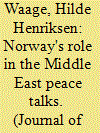

|
|
|
| 4 |
ID:
132012
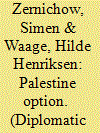

|
|
|
|
|
| Publication |
2014.
|
| Summary/Abstract |
Were the Palestinians anything more than simply a refugee problem? Since the creation of the State of Israel in 1948, the USA had pretty much ignored this haunting question. However, as the Palestinian guerrillas' wide-ranging armed struggle seemed to be approaching a climax in 1970, U.S. policy makers were forced to reassess whether they might also need to view the Palestinian issue as a political problem. In April to May of that year, U.S. State Department officials began to doubt whether the Jordanian regime would survive the civil war then brewing in that country. In response, a strategy paper examining the possibility of a joint Jordanian-Israeli-Palestinian settlement-a policy that would come to be known as the "Palestine" or "Palestinian option"-was developed within the U.S. State Department. Between October and December 1970, the National Security Council discussed various versions of this strategy paper. At the same time, members of the main Palestinian guerrilla organization, Fatah, sent messages to the Americans indicating that they might be willing to enter into negotiations. Why, then, did these efforts fail to bring about a change in U.S. policy toward the Palestinians?
|
|
|
|
|
|
|
|
|
|
|
|
|
|
|
|
| 5 |
ID:
084082
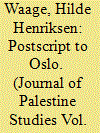

|
|
|
|
|
| Publication |
2008.
|
| Summary/Abstract |
In Norway, the secret negotiations culminating in the 1993 Oslo agreement are still seen as a shining moment in the nation's history, so when the files of the entire process were discovered to be missing from government archives, a minor public scandal erupted. After laying out the Oslo "myth" and its cast of characters, the author recounts the story of the disappearance of the files, new revelations concerning their scope, and the (thus far unsuccessful) quest to recover them. The author concludes by exploring the implications of the backchannel negotiations for the entire Oslo process and its lessons for conflict resolution, particularly third-party mediation in highly asymmetrical conflicts.
|
|
|
|
|
|
|
|
|
|
|
|
|
|
|
|
| 6 |
ID:
114168
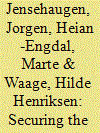

|
|
|
|
|
| Publication |
2012.
|
| Summary/Abstract |
Between early 1947 and May 1948, the Zionist movement went from being a non-state actor representing the minority population within the territory of the British Mandate of Palestine to establishing the State of Israel, which would be recognised almost instantaneously by the world's two Superpowers, the United States and the Soviet Union. Such a result, however, was never a given. What processes allowed a non-state actor, the Zionist movement, to secure international acceptance for the creation of a Jewish state in highly ambiguous circumstances? This analysis explores the dual-track adopted by the Zionist movement, whereby it worked to create facts on the ground within Palestine whilst securing support for its state-building project at the international level. By establishing state-like institutions in Palestine whilst building international support, the Jewish Agency was able to secure for itself a unique place from which to declare statehood.
|
|
|
|
|
|
|
|
|
|
|
|
|
|
|
|
| 7 |
ID:
173671
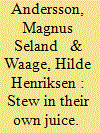

|
|
|
| 8 |
ID:
141713
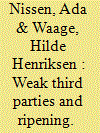

|
|
|
|
|
| Summary/Abstract |
Can weak third parties contribute to ripening conflicts for resolution despite their lack of leverage? According to the core principles of ripeness theory, mediators with leverage have a clear advantage when it comes to ripening. What is often overlooked in the literature, however, is the important ways a weak mediator can contribute to ripening as well. This article explores two noteworthy cases of weak third party ripening – the Norwegian roles in the Oslo channel between Israel and the Palestinians, and between the URNGguerrilla and the government in Guatemala. These cases demonstrate how careful interventions by weak third parties can help disputants see negotiations as a way out both in preliminary and later phases of negotiations. However, we also argue that weak third parties should not get involved in ripening unless they can call on a mediator with more leverage once substantial negotiations begin.
|
|
|
|
|
|
|
|
|
|
|
|
|
|
|
|
| 9 |
ID:
104343
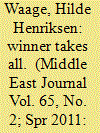

|
|
|
|
|
| Publication |
2011.
|
| Summary/Abstract |
Why is there no peace between Israel and the Palestinians? This article draws the line all the way back to the very first Arab-Israeli negotiations. In 1949, on the Island of Rhodes, UN mediator Ralph Bunche negotiated an armistice agreement between Israel and Egypt. The outcome of the first Arab-Israeli war constituted the immediate context for the negotiations and was important for the final outcome. Israel had won; the Arab states had lost the war. A large number of Palestinians had fled and had lost their homeland. After the war, Israel was in a much stronger military position than Egypt, and could resume the war if necessary. New empirical evidence shows that this imbalance of power on the ground was strengthened by strong support in Israel's favor from the UN Secretary-General Trygve Lie, as well as from the US administration. Such support served to limit the UN mediator's room for maneuver and ultimately contributed to a biased agreement. An analysis of the negotiations between Israel and Egypt at Rhodes sheds light on and widens our understanding of the approach and power relations which marked the 1949 negotiations. The armistice negotiations represent the first example of a process and an agreement based largely on Israeli premises. Such an agreement could not provide the basis for peace in the Middle East.
|
|
|
|
|
|
|
|
|
|
|
|
|
|
|
|
|
|
|
|
|